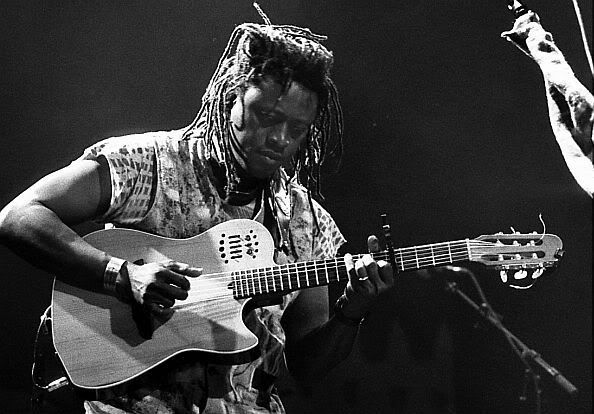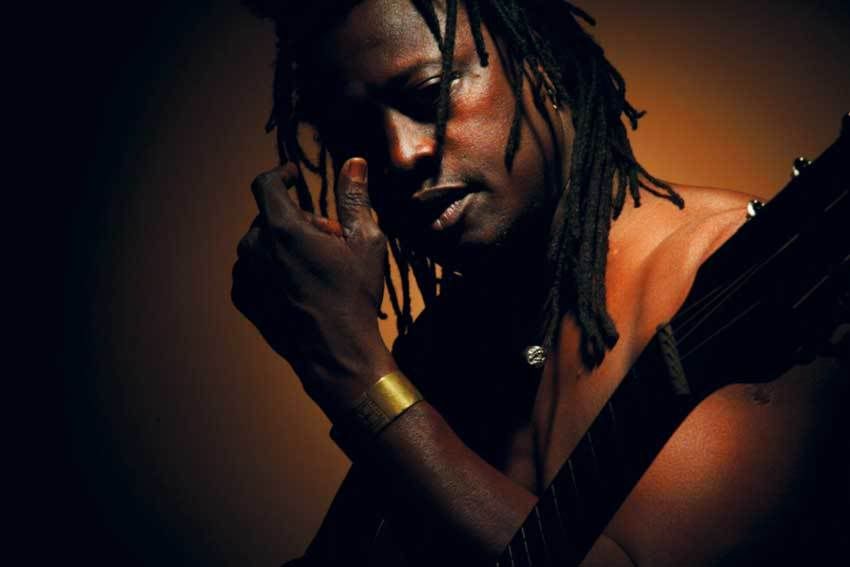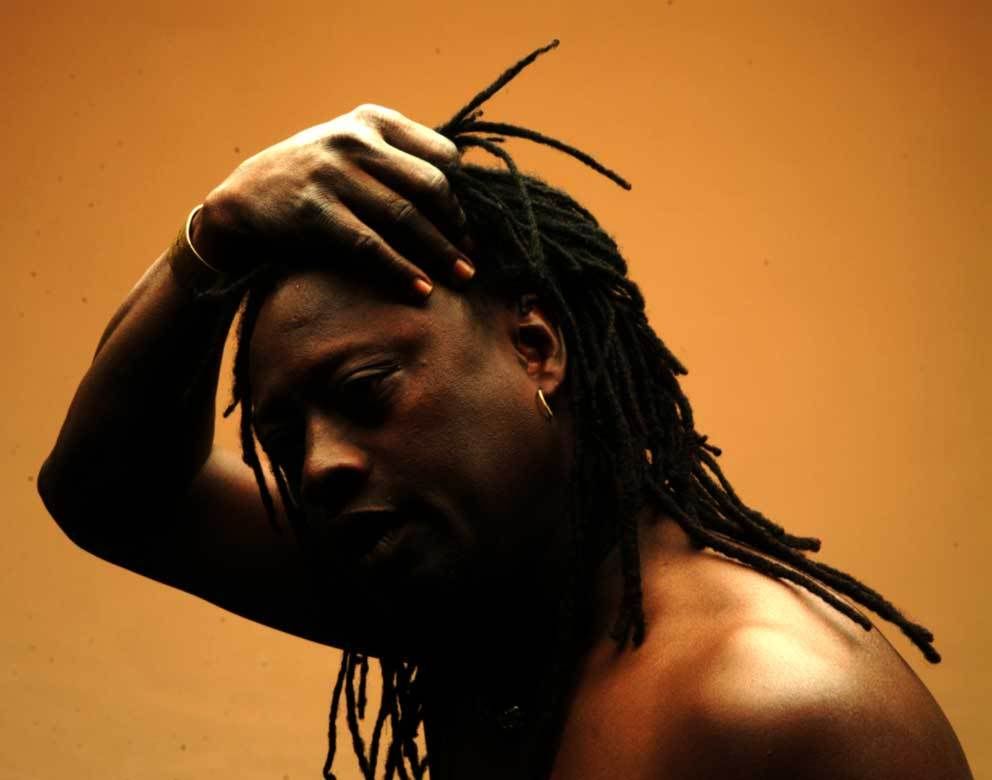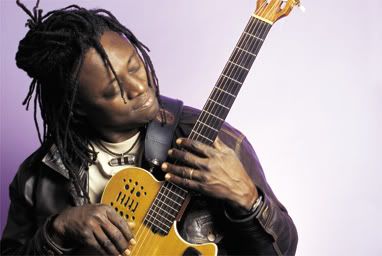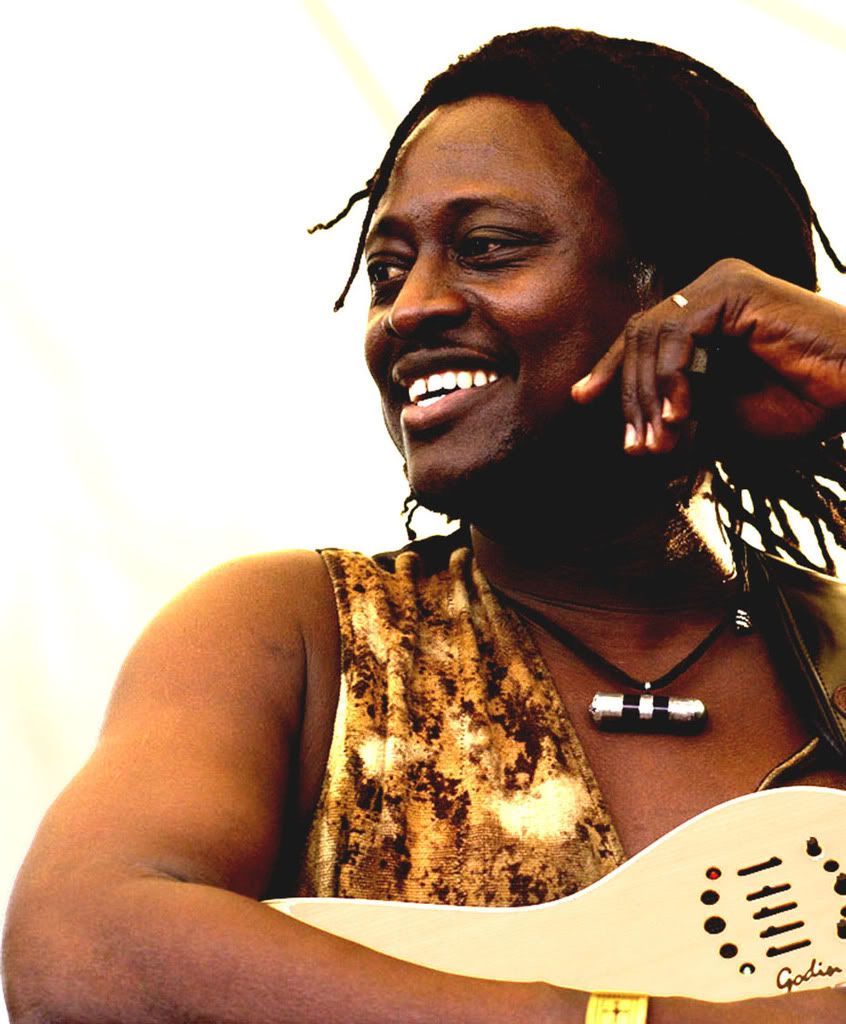A Day in the Life
 My alarm clock begins beeping at 4:15. Crickets chirp outside my darkened windows and I can hear the murmur of voices in the courtyard outside my living room window. If I ignore the alarm and fail to awaken, inevitably in a few minutes there will be a rapping on the window and someone will call my name. “Koumba, Koumba!” I swing out of bed, slip on some sandals, wrap a sarong around my waist and stumble out the door. “Aw ni sogoma” (Good morning) I croak. Four or five men sit huddled around a common bowl, scooping rice and sauce into their mouths with the right hand. “Nba, I ni sogoma,” they respond. A woman sits beside a coal brazier, stirring a large pot of hot milk. I pull up a chair and someone hands me a plate of rice. After rinsing my hands in a bowl of water, I mix the sauce into the rice with my fingers. When it cools enough to touch, I use my hand to make a sort of a spoon and begin to eat. In another part of the courtyard, children gather around other bowls, quietly eating. It’s dark; somewhere in another part of the neighborhood the muzzein is reciting parts of the Koran. Mosquitos nip at my ankles. Sulieman turns on a small radio and the familiar Parisian intonations of the ubiquitous Radio France newscast flow over my ears. Each day I find I understand and can follow the rapid text more and more, if I care to pay attention.
My alarm clock begins beeping at 4:15. Crickets chirp outside my darkened windows and I can hear the murmur of voices in the courtyard outside my living room window. If I ignore the alarm and fail to awaken, inevitably in a few minutes there will be a rapping on the window and someone will call my name. “Koumba, Koumba!” I swing out of bed, slip on some sandals, wrap a sarong around my waist and stumble out the door. “Aw ni sogoma” (Good morning) I croak. Four or five men sit huddled around a common bowl, scooping rice and sauce into their mouths with the right hand. “Nba, I ni sogoma,” they respond. A woman sits beside a coal brazier, stirring a large pot of hot milk. I pull up a chair and someone hands me a plate of rice. After rinsing my hands in a bowl of water, I mix the sauce into the rice with my fingers. When it cools enough to touch, I use my hand to make a sort of a spoon and begin to eat. In another part of the courtyard, children gather around other bowls, quietly eating. It’s dark; somewhere in another part of the neighborhood the muzzein is reciting parts of the Koran. Mosquitos nip at my ankles. Sulieman turns on a small radio and the familiar Parisian intonations of the ubiquitous Radio France newscast flow over my ears. Each day I find I understand and can follow the rapid text more and more, if I care to pay attention.I can never even eat half of the rice that is heaped on my plate, so whenever I feel like stopping I put the plate down and motion for the bowl of water to wash off my hand. The man next to me hands me a cup of hot, sweetened milk with a hunk of baguette balanced atop it. I chew the bread sleepily and drink the milk to wash it all down. I try to listen to the muted conversation of the people around me which is inevitably in Bambara with a few French conjunctions thrown in here and there. Between trying to decipher the French on the radio and the Bambara spoken around me, I’m quiet and don’t attempt to add much to the dialogue unless asked a question. At which point I respond in the best Bambara I can muster, resorting to French words to fill in gaps in my vocabulary. When I finish with the bread and milk, I thank them for the food and then go back into my house to crash into bed. It’s still quite dark outside and the mosque lulls me back to sleep.
After a few more hours of sleep and several rounds of hitting the snooze on my alarm, I shake myself awake around 7:30 or 8:00. I’m expected to show up at work sometime around 9, but no one is keeping track. I fill up a bucket with cold water and use a dipper to pour the water over me. My tiny bathroom actually has a shower but it never has enough water pressure in the morning to sustain more than a few pathetic drips. After choosing an outfit and dressing myself in Malian clothing, I tie a matching strip of cloth around my head and arrange the excess cloth so that it drapes casually around my face. I slip on my dress sandals, check to make sure everything I need is in my goatskin leather purse and head out the door to greet whomever is around. You and the morning, was the night peaceful, how is your family, may we have peace in the day, may Allah bless us during this month of Ramadan - are just a few of the things we will say to each other.
 Finally out the gate of my concession I stride down the street to catch the little green Peugot truck that is my public transportation into the center of the city. As I pass clumps of people, women selling bananas, children playing, men sitting in the shade I nod and sometimes greet them. It takes about ten minutes to reach the place where I will pick up my ride and I have to dodge motorcycles, cars, trucks, bikes, and pedestrians in order to cross the street. The green pick-up swings around the corner and the man in the back jumps out to usher passengers aboard. I climb into the vehicle, ducking my head to avoid hitting it on the low roof, take a seat on one of the benches and say good morning to the other passengers. Occasionally they will want to chat a bit, but usually everyone is lost in their own thoughts during the ride. The boy bangs on the side of the truck, running alongside and swinging himself into the back as the driver puts it in gear and we begin to roll into traffic. The same pattern is repeated at each scheduled stop. We reach the hectic street of the market and the road is clogged with green vehicles, all ferrying people to and fro. I hand my coin to the boy and tell him which stop I need to get off at. As we reach it, he bangs on the side of the vehicle and the driver pulls over. I get out and say goodbye, heading down the street to one of my two different offices. If it’s Monday or Tuesday I will have another ten to fifteen minute walk to OMATHO. If it’s Wednesday or Thursday, it’s only five minutes down a different street to CNPA.
Finally out the gate of my concession I stride down the street to catch the little green Peugot truck that is my public transportation into the center of the city. As I pass clumps of people, women selling bananas, children playing, men sitting in the shade I nod and sometimes greet them. It takes about ten minutes to reach the place where I will pick up my ride and I have to dodge motorcycles, cars, trucks, bikes, and pedestrians in order to cross the street. The green pick-up swings around the corner and the man in the back jumps out to usher passengers aboard. I climb into the vehicle, ducking my head to avoid hitting it on the low roof, take a seat on one of the benches and say good morning to the other passengers. Occasionally they will want to chat a bit, but usually everyone is lost in their own thoughts during the ride. The boy bangs on the side of the truck, running alongside and swinging himself into the back as the driver puts it in gear and we begin to roll into traffic. The same pattern is repeated at each scheduled stop. We reach the hectic street of the market and the road is clogged with green vehicles, all ferrying people to and fro. I hand my coin to the boy and tell him which stop I need to get off at. As we reach it, he bangs on the side of the vehicle and the driver pulls over. I get out and say goodbye, heading down the street to one of my two different offices. If it’s Monday or Tuesday I will have another ten to fifteen minute walk to OMATHO. If it’s Wednesday or Thursday, it’s only five minutes down a different street to CNPA. As I walk down the busy streets, beggars call for my attention. Polio victims with shriveled limbs, old blind women, young women with armfuls of children. I haven’t yet figured out how to respond to every case. Sometimes I drop a coin into their buckets, but most of the time I pass them by. It’s a helpless feeling and one that I doubt I’ll ever get used to. As I pass stalls and shops, people call out to me in Bambara “hey, white woman, your clothes are beautiful” or “your braids are lovely” or “you look like an African.” I smile and say thanks as I continue on my way. Every once in a while a persistent admirer will walk alongside me trying to engage me in French conversation. I try to be polite but continue walking and tell him that I’m busy. I actually think that I may get myself a ring to wear and tell these sorts that I’m married and that my husband doesn’t like me talking to strange men. But so far, I’ve managed.
 I get to my office and greet the guards and whomever is hanging out in the gateway. We joke around and they tell me how much I’m becoming like an African. I tell them that I couldn’t possibly be Malian because I can’t speak Bambara very well yet. Well, that will come “dooni dooni” they say. Little by little. Yes, I reply, Insh’Allah. If God wills it.
I get to my office and greet the guards and whomever is hanging out in the gateway. We joke around and they tell me how much I’m becoming like an African. I tell them that I couldn’t possibly be Malian because I can’t speak Bambara very well yet. Well, that will come “dooni dooni” they say. Little by little. Yes, I reply, Insh’Allah. If God wills it. Entering the office, I make the rounds of greetings with all who are there and spend time chatting with the secretaries. Usually this is a melange of my very clumsy Bambara mixed with my much better French. If the person I am supposed to meet with is in a meeting, I may spend the entire morning just hanging out and talking while I wait. So far, although this grates a bit against my American sense of being lazy and useless, here it’s considered very important to build strong social relationships with your coworkers. So I tell myself that and enjoy the time chatting. The reception area at OMATHO always has some tour guides coming in and out, so I talk to them about their jobs, try to learn some of their languages. I can already do the greetings in Sonhrai, the language spoken farther east and north in places like Timbuktu and Gao. I’m trying to learn a few phrases in Dogon, the language of the people group of the same name who live along a long escarpment of cliffs and still practice much of their ancient traditions. Dogon Country is one of the main tourist draws Mali has to offer. I can’t wait to get my chance to go trekking there.
Because it’s the month of Karem and people are fasting, what would be lunch time comes and goes. Not everyone fasts, so there are people going out to buy street food and they take a bit of teasing from those of us who are fasting. Every time I am offered food and refuse, saying that I’m fasting, there is shock and usually amusement. Then expressions of approval and sometimes questions as to whether or not I pray. Yes, I say, I do pray but I’m not Muslim. I pray in the Christian manner. Oh, they respond. You mean like this? While they make the sign of the cross. Not exactly, I explain, I’m not Catholic, I’m Protestant. How do you pray? They ask. Anytime, anywhere, I respond. Ahhh. They look amused and curious. They tell me I should come to prayers with them sometime. I say we will have to wait and see. Then we all laugh and move onto another subject.
 When I finally get to meet with whomever I’m assigned to that day, we speak French and he or she explains what their part of the office is responsible for. I try to ask questions so as to better understand. The other day at CNPA, I asked if someone could take me down the street to the Maison des Artisans where all the artisans work and sell their crafts. We went there and I was given an informal tour of the place. It’s essentially a big market and workshop. Leather being stretched and cut into sandals and bags, wood being carved into masks and figurines, beads being strung, cloth being woven, silver being heated and hammered into jewelry. I think I would like to buy one of everything, it’s all so lovely and interesting. I can’t wait to start buying items piece by piece to decorate my house. I met with the president of the maison, himself a jeweler and he was very enthusiastic and happy to learn that a volunteer was being assigned specifically to help in the artisan sector. He wants me to come back next week to spend some time getting to know people there and talking about projects we might undertake.
When I finally get to meet with whomever I’m assigned to that day, we speak French and he or she explains what their part of the office is responsible for. I try to ask questions so as to better understand. The other day at CNPA, I asked if someone could take me down the street to the Maison des Artisans where all the artisans work and sell their crafts. We went there and I was given an informal tour of the place. It’s essentially a big market and workshop. Leather being stretched and cut into sandals and bags, wood being carved into masks and figurines, beads being strung, cloth being woven, silver being heated and hammered into jewelry. I think I would like to buy one of everything, it’s all so lovely and interesting. I can’t wait to start buying items piece by piece to decorate my house. I met with the president of the maison, himself a jeweler and he was very enthusiastic and happy to learn that a volunteer was being assigned specifically to help in the artisan sector. He wants me to come back next week to spend some time getting to know people there and talking about projects we might undertake. By two or three o’clock things at the office are slow and I usually take my leave. I catch the same truck from the morning, on a different leg of it’s route and get off near the Peace Corps office. Sometimes I come into the office to check my mail, see if a computer is free to check email, or just to talk with the staff. Then I walk to my tutor’s house for my language lesson. We sit outside in the courtyard under the trees and talk. I try to recount my day using whichever language we are focusing on that day. If it’s Bambara, the explanations are brief and straightforward. In French, I am working on getting more nuances and verb forms to flesh out my conversations as I am already proficient enough in simple discussions. Abdoulaye pulls a blackboard against the wall of the house and writes examples in chalk as I ask questions. As people come in and out of the courtyard, we greet them and sometimes talk with them for a bit. Practical application of language, after all. We stop at four o’clock briefly so he can pray. Then continue till around five.

At this point, we are both ready for six o’clock to come and the fast to be broken. Often, we will go out to the store around the corner and buy juice and yogurt, preparing for the call from the mosque that signals the end of the day’s fast. As soon as it the call begins we start by eating dates. I remember that I have always liked dates, but for some reason at the end of a day of fasting they seem to taste better than any food I have ever eaten. We drink steaming bowls of an herbal infusion like tea. It’s amazingly thirst-quenching and is apparently very medicinal and good for you, as well as tasting really good. Other members of the household come out to break fast with us and we all tell each other “I ni baara ji” which literally means “you and your work” but is often used when someone has done a good job at something. After the dates, the tea, the yogurt and the fruit juice, I feel sleepy and content. We usually all sit around rather quietly and reflectively, Abdoulaye and his friend smoking as they haven’t been allowed to do so all day. They wash and prepare to pray and I sit and read. After their prayers, we sit and talk and people begin to arrive for the evening’s communal prayer time/Koran recitation. Then the men go onto the porch and the women into the house. I’ve noticed that the men take turns leading the recitation. The melancholy Arabic tones drift past me and I spend the half-hour thinking, reflecting, studying my language notes, and doing a little praying of my own.
Afterwards, we sit around a common bowl and eat supper. Usually by this time I am tired and ready to head back to my house. Since it’s dark outside and my house is about a twenty-five minute walk, Abdoulaye has his friend drive me home or finds me a cab. I arrive at my house and the little shop that faces out into the street is always full of men on the front porch, watching television or drinking tea. “Koumba, you’re back!” they call. Sometimes I take them up on the invitation to join them in sitting and chatting. It’s a good chance for me to practice Bambara. Then I go into the courtyard and greet whoever is there, usually some women and children. I cross the courtyard to my house, unlock the door and go in. I flip on the lights, always aware of how lucky I am to have electricity as most volunteers in this country do not. After changing and slipping into bed, I write in my journal about my day, trying to make notes of whom I spoke to and what their names are so that I can remember them in the future. I study French verbs. I read a bit of a novel until I’m tired enough to sleep and then switch off the light, lulled to sleep by the sound of the oscillating electric fan.




